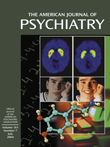Borderline Personality Disorder Criteria Associated With Prospectively Observed Suicidal Behavior
Abstract
OBJECTIVE: The authors prospectively examined associations between each DSM-IV borderline personality disorder criterion and suicidal behaviors. METHOD: Borderline personality disorder diagnosis and criteria, major depressive disorder, substance use disorders, and history of childhood sexual abuse were assessed with semistructured interviews. Participants (N=621) were followed for 2 years with repeated structured evaluations that included assessments of suicidality. RESULTS: With the self-injury criterion excluded, the borderline personality disorder criteria of affective instability, identity disturbance, and impulsivity significantly predicted suicidal behaviors. Only affective instability and childhood sexual abuse were significantly associated with suicide attempts (i.e., behavior with some intent to die). CONCLUSIONS: Affective instability is the borderline personality disorder criterion (excluding self-injury) most strongly associated with suicidal behaviors. Since major depressive disorder did not significantly predict suicidal behaviors, the reactivity associated with affective instability (more so than negative mood states) appears to be a critical element in predicting suicidal behaviors.



